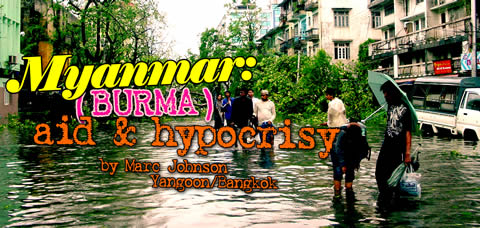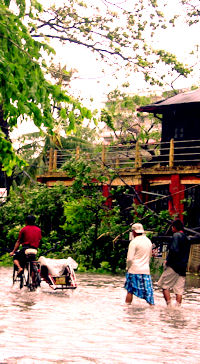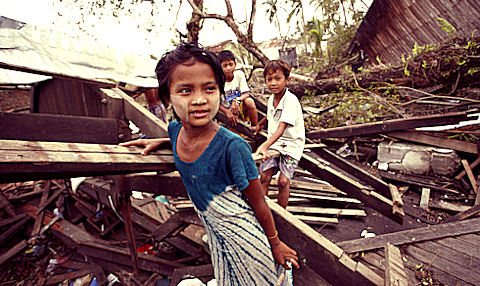Posted May 12, 2008

Response to the tropical cyclone Nargis, which hit Myanmar on 3 May 2008 has been hijacked by vested interests on all sides, leaving millions of Asia’s poorest people without any effective aid.
The greatest responsibility rests with Myanmar’s military government, which failed to warn the population of the cyclone, and has still not mounted an effective disaster response program. The country’s huge army and police forces were completely absent from the streets of Yangoon
(formerly Rangoon) until two days after the cyclone hit – leaving most of the city’s four million inhabitants wandering desperately through knee high water, trying to contact family members and find something to eat or drink, suddenly deprived of electricity, telephone or drinking water. Only the City of Yangoon was able to offer some services to the urban poor – with a fairly efficient free distribution of drinking water. The semi-governmental Myanmar Red Cross also provided some assistance and advice. But overall, the disaster response has demonstrated once again that Myanmar’s junta is arrogant, out of touch and parasitical, and completely unable to meet the basic needs and rights of the population. International media and humanitarian charities have rightly condemned this failure to protect.

But the behaviour of Myanmar’s business and middle classes – the main supporters of the pro-western opposition around their symbolic leader Aung San Suu Kyi, has shown that they are completely unfit to take charge of the country, despite their undeniable popular support. Commercial enterprises large and small jacked up the prices of all essential commodities by 200 to 400% immediately following the cyclone. With most of Myanmar’s 50m inhabitants – small farmers – living on less than 1 EUR per day, this callous profiteering will have a terrible effect on nutrition, particularly for the very old and the very young – already most at risk from the secondary effects of the cyclone, like malaria, dysentery and water-born diseases.
One of the few public policies that does help the country’s poor – the provision of government-subsidised petrol and oil, would be abolished if Aung San Suu Kyi’s pro-western National League for Democracy took power.
Western interests have also exploited the cyclone to advance their own agenda – opening Myanmar to western investment on the same unequal terms as in Cambodia, and imposing a more malleable government that would revoke recent agreements giving China access to Myanmar’s ports. French foreign minister Bernard Kouchner suggested on 6 May that western powers should invoke their global ‘right and duty to protect’ and deploy military-civil aid missions without the consent of the Myanmar government. US officials – coordinating the hundreds of aid workers and journalists now massed in Bangkok waiting for the green light, have started circulating widely exaggerated estimates of the number of victims, in order to marshal the humanitarian charities and journalists behind the US’s aggressive plans for regime change.

Although it is not officially celebrated in the United States, May 1, International Workers’ Day, has its roots in the early US labor movement. In 1886, workers across the country struck for the eight-hour day, and in Chicago, a May 4 rally at Haymarket Square turned violent. Eight anarchists were tried for murder and four were put to death. In their honor, socialists and workers organizations worldwide began celebrating the acheivements and vision of labor on May Day. Click here to read the words of Iraqi unionists and an editorial by Nativo Lopez, a leader in the immigrant movement.
Not that many of the private aid agencies and charities need much persuading. Closely linked to missionary groups that have been working in the Burmese border region since British colonial times, and expecting to receive tens of millions of dollars of easy money when the Myanmar junta caves in, most of the aid industry is unable to distance itself from great power interests in the region.
A smaller number of international solidarity campaigns are going against this depressing general pattern. Buddhist groups across Asia have found ways to channel support through Myanmar’s monasteries and temples – where many of the cyclone victims have taken shelter. Others have linked to émigré and underground student and pro-democracy groups, not all of whom have been fooled by the US charm offensive and dollar largesse towards the émigré circles.
The coming weeks will not just witness a struggle to aid the hundreds of thousands of people made homeless by cyclone Nargis, and the millions now slowly starving thanks to the combination of regime incompetence, US-led sanctions and local profiteering. We are also witnessing a struggle to redefine the contours of Myanmar politics, possibly including the collapse of the country’s foul military rulers.

Marc Johnson was in Yangoon when cyclone Nargis hit. He is currently engaged in aid coordination efforts in neighbouring Thailand.
